So Shapely, Innit?
So shapely, innit?

I feel like a Victorian man seeing an ankle…
More Posts from Gentildonna and Others
One thing I love about Crowley --never stated, but consistently shown-- is that he is, at heart, an engineer.
I have a few different things to say about that. Let's unpack them.
As the Unnamed Angel, we see his designs for the Pillars of Creation are millions of pages long, comprised of cramped text, footnotes, diagrams, schematics, etc. It's very...Renaissance polymath, in the way it implies a particular intersection of artist and inventor.
Also: in the naked romanticism with which he views his stars.
We already knew he made stars, but in s2 we learn that he did NOT sculpt each of them by hand. He designed a nebula ("a star factory," he says) that will form several thousand young stars and proto-planets, and all --aside from getting the 'factory' running-- without him lifting a finger. We also learn that these young stars and proto-planets stand in contrast to those made by other angels, which are going to come 'pre-aged.'
...I'm reminded of Hastur and Ligur's approach to temptations. Damning one human soul at a time, devoting singular attention to it over the course of years or decades, and how that stands in contrast to Crowley's reliance on, quote, 'knock-on effects.'
Ligur: It's not exactly...craftsmanship. Crowley: Head office don't seem to mind. They love me down there.
Hm.
I'm also reminded of the M25.
The M25 may not be as grand as a nebula (sentences you only say in GOmens fandom...), but LIKE his nebula it's an intricate, self-sustaining engine that does Crowley's work for him, many times over. Again.
That's some pretty neat characterization --and so is the indication towards Crowley's disinterest in victimizing anyone tempting individual people. It takes a considerable amount of planning and effort (and creeping about in wellies), but in accordance with his design the M25 generates a constant stream of low-grade evil on a gigantic scale.
Cumulatively gigantic, that is. Individually? Negligible.
But no other demon understands human nature well enough to parse that one million ticked-off motorists are not, in any meaningful way, actually equivalent to one dictator, or one mass-murderer, or even one little influential regressive. That's the trick of it. Crowley gets Hell's approval (which he NEEDS to survive, and to maintain the degree of freedom he's eked out for himself), and at the same time ensures that any actual ~Evil Influence~ is spread nice and thin.
It's some clever machinery. And he knows it, too:
The Unnamed Angel and Crowley are both proud of their ideas.
(musings on professional pride, Leonardo da Vinci, the crank handle, and 'the point to which Crowley loves Aziraphale' under the cut)
In the 1970's Crowley gives a presentation on the M25, projector and all, to a room full of increasingly impatient demons. Maybe the presentation was work-ordered; the 'can I hear a WAHOO?' definitely wasn't.
Before the Beginning, the Unnamed Angel can barely contain his excitement about his nebula. Aziraphale manages a baffled-but-polite, "....That's nice... :)"
11 years ago, Hastur and Ligur want to 'tell the deeds of the day,' and Crowley smiles to himself because (according to the script-book) he knows he has 'the best one.'
(Naturally, his 'deed' has nothing to do with tempting anybody, and everything to do with setting up a human-powered Rube-Goldberg machine of petty annoyance. Oodles of 'Evil' generated; very little harm done.)
Hastur and Ligur don't get it, of course. That's also consistent.
Nobody ever knows what the hell he's talking about.
It didn't make it on-screen, but, in both the novel AND the script-book, Crowley was friends with Leonardo da Vinci. The quintessential Renaissance polymath. That's where he got his drawing of the Mona Lisa --they're getting very drunk together, and Crowley picks up the 'most beautiful' of the preliminary sketches. He wants to buy it. Leonardo agrees almost off-the-cuff, very casual, because they're friends, and because he has bigger fish to fry than haggling over a doodle:
He goes, "Now, explain this helicopter thingie again, will you?" Because he's an engineer, too.
(It is 1519 at the latest, in this scene. Why the FUCK would Crowley know about helicopters, and be able to explain them, comprehensively, to Leonardo da Vinci?
...Well. I choose to believe he got bored one day and worked it out. Look, if you know how to build a nebula, you can probably handle aerodynamics. And anyway, I think it's telling that this is his idea of shooting the shit. 'A drunken mind speaks a sober heart,' and all. He probably babbled about Aziraphale long enough to make poor Leo sick)
Apart from Aziraphale, Leonardo da Vinci is the only person Crowley has any keepsakes or mementos of.
Think about that, though. Aziraphale's bookshop is bursting with letters, paintings, busts, and personalized signatures memorializing all the humans he's known and befriended over 6000 years (indeed: Aziraphale has living human friends up and down Whickber Street. He's part of a community).
Crowley doesn't have any of that. It's just the stone albatross from the Church (for pining), the infamous gay sex statue (for spicy pining), the houseplants (for roleplaying his deepest trauma over and over, as one does), and this one piece of artwork, inscribed, "To my friend Anthony from your friend Leo da V."
To me, at least, that suggests a level of attachment that seems to be rare for Crowley.
...Maybe he liked having someone to talk shop with? Someone who was interested? Someone engaged enough to ask questions when they didn't immediately understand?
...Anyway.
There's also the matter of the crank handle.
This thing:
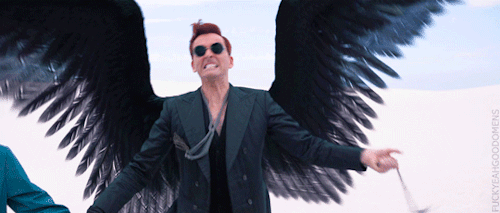
This is one of the subtler changes from the book. In the book, Crowley knows Satan is coming and, desperate, arms himself with a tire iron. It's the best he can do. He's not Aziraphale; he wasn't made to wield a flaming sword.
The show, IMO, improves on this considerably. Now he, like Aziraphale, gets to face annihilation with what he was made for in his hand. And it's not a weapon, not even an improvised one like the tire iron.
He made stars with it.
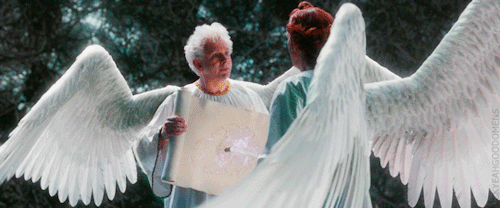
[both gifs by @fuckyeahgoodomens]
If you Google 'crank handle,' you'll get variations on this:
Crank handles have been around for centuries. Consisting of a mechanical arm that's connected to a perpendicular rotating shaft, they are designed to convert circular motion into rotary or reciprocating motion.
Which is to say they're one of the 'simple machines,' like a lever or a pulley; the bread and butter of engineering. You'll also get a list of uses for a crank handle, archaic and modern. Among them: cranking up the engine of an old-fashioned car... say, a 1933 Bentley. That's what Crowley has been using his for, lately. But he's had it since he was an angel and he's still, it seems, very capable of it's angelic applications.
Stopping time. For instance.
(This is conjecture on my part, but, I like to imagine that Crowley has the ability to stop time for the same reason I can --and should-- unplug my computer before I perform maintenance on it. Time and Space are a matched set, after all, and in his designs in particular, one feeds into the other.)
I know everyone has already said this, but: I REALLY LIKE that when he needs to channel the heights of his power, he does so not with a weapon but with a tool. Practically with a little handheld metaphor for ingenuity. One from long-lost days when he made beautiful things.
(And he loved it. Still loves it --he incorporated that metaphor into the Bentley, didn't he?)
Let Aziraphale rock up to the apocalypse with a weapon: he has his own compelling thematic reasons to do exactly that. Crowley's story is different, and fighting isn't the only way to express defiance. And if you've been condemned as a demon and assumed to be destructive by your very nature, what better way than this?
He made stars. They didn't manage to take that from him.
Neither Crowley nor Aziraphale are fighters, really --they have no intention of fighting in any war. They'll annoy everyone until there's no war to fight in, for a start. But between the two, if one must be, then that one is Aziraphale. Principality of the Earth, Guardian of the Eastern Gate, Wielder of the Flaming Sword... all that stuff. Even if he'd prefer not to, it's very clear that Aziraphale can rise to the occasion, if he must.
Crowley was never that kind of angel. He wasn't a Principality. He doesn't have a sword.
...And yet.
It's Crowley who protects. He's the one who paces, who stands guard, who circles Aziraphale and glares out at the world, just daring anyone else to come near.
In light of everything else I've said here, I think that's interesting.
Obviously part of it is that Aziraphale enjoys it and, you know, good for him. He's living his best life, no doubt no doubt no doubt. But what about Crowley? What's driving that behavior, really?
Have you heard the phrase, 'loved to the point of invention'? Well, what if 'the point of invention' was where you started? What if where you end up involves glaring out at the world, just daring anyone else to come near? What is that, in relation to the bright-eyed thing you used to be?
What do we name the point to which Crowley loves Aziraphale?
...Thinking about how an excitable angel with three million pages of star design he wants to tell you all about...becomes a guard dog. Is all.
what was the first DT role you watched? excluding nativity 2, mine was actually inside man??? which I know is a bit weird
(sorry I don't want to add too many options)

Part 3 Voyage of the Damned
I think I have a potentially controversial opinion on Aziraphale and the ending.
So one of the things that made me smile so, SO much, was THIS:


That PURE ABSOLUTE UTTER JOY.
We have not seen ANYTHING like that from demon Crowley. We've seen him be drunk and silly, we've seen him be amused, but we've not seen this.
Now, let's consider what we know about Heaven:
It's never fully populated. ALL of the shots are completely devoid of angels, except for a few, who are almost always just getting somewhere and never really talking to each other.
Where I thought the archangels were a tight clan, it really looks like they're super catty and prone to jealousy. No doubt they would stab each other in the back happily if it came down to it. How much of Heaven is like that, if even the archangels all hate each other?
Aziraphale already has a nervous disposition when he meets Crowley. Is he perhaps an angel that NEVER fit in? Is he familiar with being ostracized by his peers? Just how lonely IS Heaven? Crowley seems to be a pretty powerful angel, and HE doesn't even know that it's all getting shut down in 6000 years -- it's like no one talks to anyone.
Aziraphale, during their whole meeting, looks absolutely smitten. At one point, Crowley goes, "Look at you! You're gorgeous!" and Aziraphale looks over with happy surprise, just before realizing he's not looking at him but rather at what he's created. And then, when Crowley starts going on about making suggestions and asking questions, Aziraphale is IMMEDIATELY concerned and doesn't want him to get into trouble.
Aziraphale is hooked on this angel, and I cannot help but think that this is perhaps the first angel who has ever WELCOMED Aziraphale into his company.
He is hooked on this angel, and the way Crowley smiles is with the light of all the stars he's just created, and it's infectious and it brings a smile to Aziraphale's face as well. And then this angel shields him from the oncoming falling stars.
He is hooked on this angel, and then this angel goes and joins the Great Rebellion, and becomes fallen himself.
"You were an angel once," Aziraphale said, softly, at the bandstand. He remembers.
I think it's reasonable to guess that Heaven has never felt so warm as it did in the presence of millions of exploding stars, next to the (arch?)angel that may perhaps be one of the few (only?) to pay him any positive attention.
I think it's reasonable to assume that Heaven was not the same after Crowley fell. I wouldn't be surprised to find out Aziraphale had wondered about the angel, wondered if he was okay. I would imagine that Aziraphale keeps that picture of pure, angelic, unbridled joy somewhere inside of him.
So, really, is it any surprise that threaded throughout EVERY interaction, Aziraphale has this deep-down feeling that Crowley is good? Would it be any surprise that Aziraphale, an angel who goes along with Heaven as far as he can (which isn't always), feels that if HE is still an angel, then what was done to Crowley was a great injustice?
I think it would make sense that we are shown "before the beginning" not just because it is fun, but because THIS is the foundational context for everything Aziraphale thinks Crowley is, everything Crowley enjoys. I think he remembers this moment and wishes he could live there forever. With Crowley. The two of them with this happiness, forever.
But nothing lasts forever, as much as he wishes it did.
I'm not saying Aziraphale was right with what he did to Crowley at the end of s2. There is a lot I think he did wrong. I think he held onto this picture so tightly, he didn't realize that Crowley had long since let it go, and painted a new one with Aziraphale with all the shades of grey he picked up as he sauntered (or plummeted) vaguely downward (into a pool of boiling sulfur).
I don't think he was right, but I do think he is understandable. I think there was a lot of selfishness, but also some misguided selflessness too. I watched that first scene with angelic Crowley and my heart actually broke a little, because I thought, "What a shame this joy was taken away from him."
I think Aziraphale is trying to right the injustice he feels has been done. But I also think Aziraphale doesn't realize that Crowley can never go back. The concept of falling never crossed Crowley's mind when he suggested that he ask a few questions, and he will NEVER get that kind of innocence back. And Aziraphale doesn't understand, because Heaven has clearly always just been that way for him (he is already aware of the danger of asking questions).
Crowley does not want to go back because he can never go back. He can never be the same angel he was when he thought he could build a universal machine that would crank out stars for eons and eons. He can never be the same angel he was when he thought he could make some suggestions and ask some questions and co-create with THE Creator.
Crowley understands that, and Aziraphale doesn't. But I can understand why Aziraphale would want to try. And I think it's all because of this:









Takin' Over The Asylum (1994) | 1.02 Fly Like an Eagle
You Say Potato, I Say Excellent! Or blocking, accents and legacy of morality tales in ‘The Resurrectionists’ minisode PART II
Alternate title: how Aziraphale’s naivety in this episode was supposed to make you a bit outraged
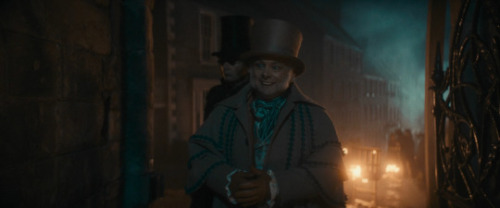
I have to shout out to @bowtiepastabitch for their AMAZING historical analysis of this minisode - it prompted me to finish this long ramble that has been drifting in my notes. Anyway, I have a major obsession with the ways blocking and dialogue interplay in Good Omens - you can check out my analysis of the blocking in the flashbacks in S1. But The Resurrectionists is really something special. This got so long I am splitting it into two parts.
What we see in this minisode is a morality tale - a genre of children’s literature that was extremely popular in the early 1800s where the minisode is taking place. Catch up on the historical background in Part I.
When looking at this minisode, it is really important to look at two complementary narrative tools - Crowley’s accent and the placement of Aziraphale in relation to Crowley. Through the minisode, Crowley switches between his standard English accent and a delightful Scottish accent. But the switching isn’t random!
Scottish lines = character Demon Crowley, who moves the plot of the story along
English lines = Crowley, the moral guide leading Aziraphale
Additionally, the two of them swap sides in their blocking frequently in this episode. Their standard placement is A/R + C/L but the swap to C/R + A/L is almost the norm in this minisode.
Analyzing Blocking and Dialogue
We open in the graveyard, with Aziraphale and Crowley in their standard placement, observing the statue of Gabriel. But then they notice Elspeth, digging up a corpse. When Aziraphale approaches Elspeth to inform her that her actions are Not Good, he actually ends up swapped with Crowley and finds himself on the left because what he is doing - making moral judgments on the actions of Elspeth with no understanding of what led her here - is doing Good, not good.

The next scene finds Crowley helping Elspeth cart the corpse away from the graveyard, while the trio debate all the other ways Elspeth could make money - Aziraphale suggests running a bookshop, farming, weaving, giving the standard Good party line about hard work blah blah blah. Aziraphale remains on the left - after all, those supposed options are completely unrealistic, unobtainable professions for someone in Elspeth's socioeconomic position. They aren't remotely helpful suggestions.
Aziraphale only finds himself back on the right when he and Crowley are introduced to Wee Morag, and have some time to listen and observe the reality of their situation.
Then, off we go to complete our journey to sell the body. Aziraphale and Crowley find themselves having a debate about morality, but Aziraphale is again ON THE LEFT as he waxes poetic about the virtues of poverty - doing Good, not good again. What I loved here was you saw the clear purpose between Crowley’s two accents as he switched mid-line -

Crowley: (SC) Oh, I'm down with wicked! (EN) Anyway, is it wicked? She needed the money.
Upon reaching the lodging of Mr. Dalrymple, FRCSE, Crowley and Aziraphale take their standard places but this scene has one really important moment that I want to highlight. When they open the barrel to find the rotted corpse, the look on Crowley’s face is so telling. He often finds Aziraphale’s machinations amusing even when they are annoying, but here he looks decidedly disappointed. Aziraphale might have done Good by rendering the body unsellable, but what good did it do? The body is still been un-interred. Elspeth has wasted her energy, and has made a terrible first impression of the surgeon whom she needs to pay her for her services. It looks like Crowley wants to say something, but he stops himself and clenches his jaw. The PATIENCE he is showing to Aziraphale - this is a quality that Crowley has in SPADES but we really see him exercise it here.
After the discussion with Mr. Dalrymple, in which Aziraphale realizes the importance of dissections for educating medical students and thus leading to better care for the living, he asks the right question - why should the poor have to risk death to obtain bodies? But he let's himself get sidetracked by a blatant appeal to his emotions...
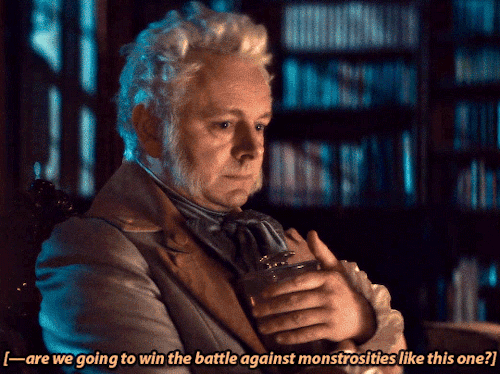
At this point, Aziraphale goes all in on body snatching being Good. Which... it still isn't because it is based on a broken system that disadvantages the poor? FOCUS, angel. He even goes as far as to offer to help Elspeth and Wee Morag in obtaining another corpse but note that again, he is on the LEFT -
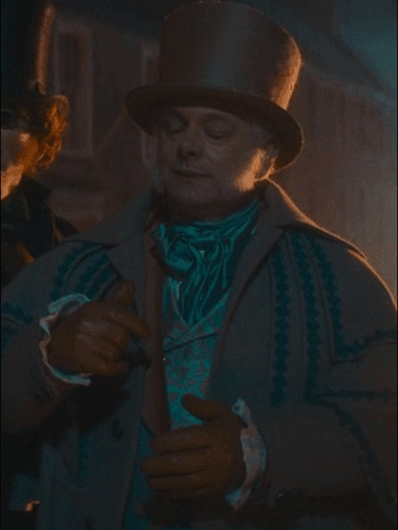
Remember, Wee Morag is deeply conflicted about the morality of body snatching, and instead of explaining anything to her (like, that having your body dissected won't keep you out of heaven would be start) Aziraphale just sort of joins Elspeth in pressuring her to join in - which is pretty awful and coercive, but gee if that isn't just heaven's playbook for doing Good, not good.
So we return to the graveyard, and this is where everything goes sideways. Aziraphale spends basically this entire sequence on the left. First, he notices the ingenuity of the grave guns but fails to acknowledge the travesty of so much energy being spent on protecting wealthy corpses while the poor suffer. Then, the tragedy strikes. After Wee Morag is shot, Aziraphale wastes time justifying saving her, resulting in her dying before he can act. And after all this, after the heart break of seeing her partner die, we see Elspeth come to the logical conclusion. If body snatching is Good, then might as well take Wee Morag off to Mr. Dalrymple, right?
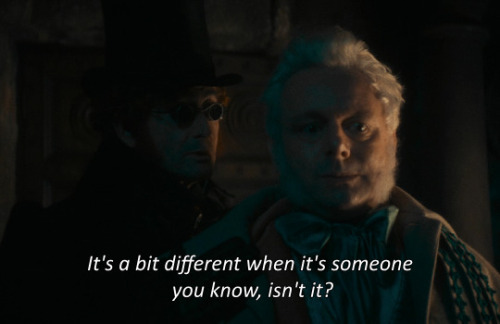
What shouldn't be overlooked is what takes place when Elspeth gets Wee Morag's body to Mr. Dalrymple. Because while Aziraphale is very clearly illustrating the dangers of black and white morality through religion, Dalrymple is showing that black and white morality through science is just as bad. Dalrymple has unshakable belief in the power of science and knowledge to alleviate human suffering and sees his work at Good. He cares about preventing illness, but ignore his role in perpetuating poverty - an unfortunate side effect of rigid belief systems of all shapes and sizes. He is downright cruel to Elspeth.
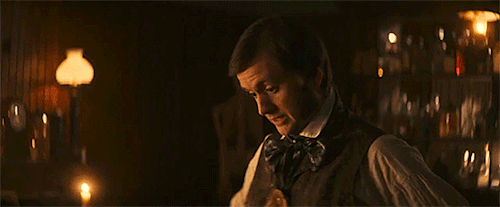
This is already getting real long, so we won't go into the absurdist comedy of the scene in the tomb - suffice to say that the surreal nature of Crowley's bargaining with Elspeth smacks of a fantastic tales of pacts made with the devil. It's delightfully unhinged.
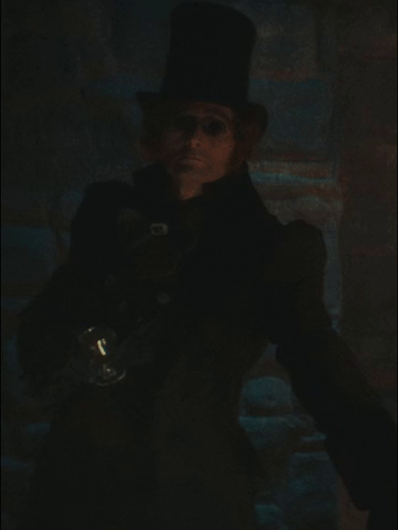
The one line I think worth pointing out?
"Do I sound like a goat?"
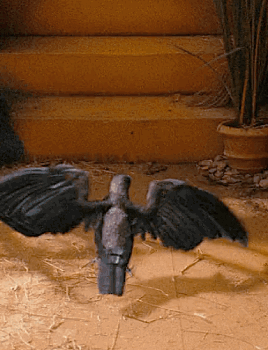
I think this line is key in the narrative connection between the three minisodes in S2. All three flashbacks show Crowley and Aziraphale engaging in acts of deception, but they all have important differences:
In A Companion to Owls, the two work together, and they manage to pull off the trick and evade punishment.
In Nazi Zombies from Hell, Aziraphale comes up with a plan and Crowley goes along with it, and they barely manage to evade punishment.
In The Resurrectionists, Crowley comes up with a plan and Aziraphale goes along with it, and Crowley is sucked down to hell.
I think it's worth noting just how silly Crowley is in the first two minisodes. Bildad and Scottish Crowley are FUN even when dealing real heavy shit. Just a complete joy to watch. And we never see that level of silly from him again. Whatever happened in hell was clearly really bad since the next time we see him in St. James Park he is asking for holy water. He may have moments, but he is never the same.
Questions, comments, additional thoughts? Lay them on me. I'd love to dig into new lines of inquiry on this minisode because I just love it so much <3
"Wild Blue Yonder" dealt with some of the emotional fallout of the Flux, so I want to rewind a bit and look at what that means for the Doctor.
I know that the Timeless Child and the Flux are contentious topics. I'm not here to argue either way. But now those storylines have decisively not been retconned, and with both of these fresh in my memory, I feel the need to offer some context for anyone who may not have seen it, and to recontextualize it for myself and anyone who has.
NotDonna: You don't know where you're from. The Doctor: How do you know that? How does anyone know? How does Donna know?
In "The Timeless Children", we find out that the Doctor was discovered as a child alone under a wormhole, and adopted by a woman named Tecteun. There was an accident where the Doctor fell from a cliff and regenerated, and subsequently Tecteun performed "experiments" on them to try to understand regeneration. The show minces words about this but she killed a child a whole bunch of times is what happened. Her experiments created the Time Lords and allow them to engineer their regeneration properties. The Doctor has no memory of any of this, and only finds out via the Master and information stored in the Time Lord Matrix.
The Doctor, predictably, doesn't tell anyone about this revelation. She makes a speech to the Master about how this makes her more, we get a single shot of her looking a bit tired in the TARDIS, then she immediately gets thrown in prison.
Ultimately, the Doctor doesn't know where they're from or who their parents are. And the very fact that they're not from Gallifrey is information that no one in the universe should have. Everyone who knew is now dead.
NotDonna: I saw it in your head. The Flux. The Doctor: It destroyed half the universe because of me. We stand here now, on the edge of creation, a creation which I devastated, so yes I keep running, of course I do! How am I supposed to look back on that? NotDonna: It wasn't your fault! The Doctor: I know!
A fun fact about the Flux is that the Doctor did not cause it. So why does he blame himself? Because the person who caused the Flux was Tecteun.
The reason why Tecteun wanted to destroy the universe is because the Doctor interfered with things too much. Too much morality. Too inspirational to people. She calls them a virus. So her solution to the problem of the Doctor is to destroy the universe, with the Doctor inside, and take her ship to a different universe to start fresh. She also was the one to steal all the Doctor's memories of previous lives in the first place. She's dismissive and patronizing and clearly does not care about the Doctor on an emotional level at all. Tecteun is a piece of work, and the implications of her actions and how they've shaped the Doctor have the potential to go deep.
Thirteen doesn't get too much of a chance to react to any of this, because there is plot going on. And shortly after they reunite, Tecteun gets killed by a different villain. So there was no emotional closure in the moment, and there's now no possibility for the Doctor to make sense of her actions. The Doctor does not tell any of her friends about any of these events. She keeps promising to tell Yaz but does not.
"Wild Blue Yonder" is the first time we, as the audience, hear the Doctor discuss the Flux. And their perception of events is skewed at best. The Flux wasn't caused because the Doctor made a mistake and a lot of people were killed, which is what you can argue for many other situations. The Flux and the devastation of the universe was caused by their mother, who promptly turned around and told them it was their fault for being such an interfering nuisance. We know that the Doctor is often an unreliable narrator, but this is beyond that. These are the words of an abused child who has internalized the narrative that the abuse was their fault.
So the Doctor being able to talk about this with Donna, who has seen what happened, who knows him, and tells him that it's not his fault — it means so much to him. He wants it to be her so badly. And then NotDonna laughs in his face. You can see the devastation. He thinks for one moment that he can finally talk about this with his best friend, and it's snatched away from him. He gives himself a moment to break down in the corridor, and then you can see the walls rebuilding as he suppresses it all again.
At the very end of the episode, back in the TARDIS, he's trying very very hard to be nonchalant. I'm curious. The NotDonna could remember all these things that happened to me while we were apart. Can you? Just wondering. Things happened, but I'll be fine. In a million years. It's not a joke.
He wants so badly to be able to talk about this. You can see it in all the lines of his body language. He's keeping himself together but is prepared to fall apart in an instant. He doesn't want to actually tell anyone, but if Donna just magically knew already, and could tell him it wasn't his fault — well, that would make the world of difference. But she doesn't know, and he can't bring himself to tell her. And so the cycle continues.
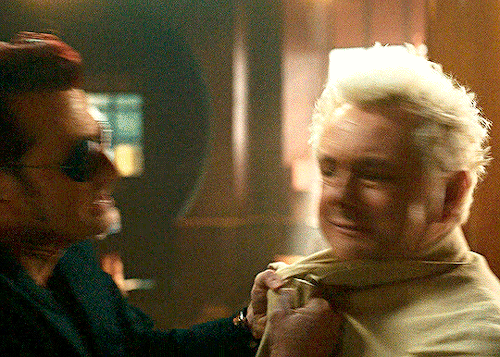
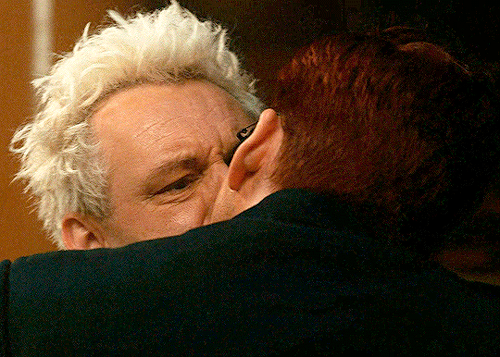
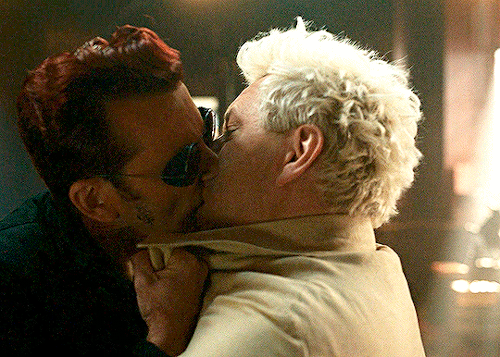
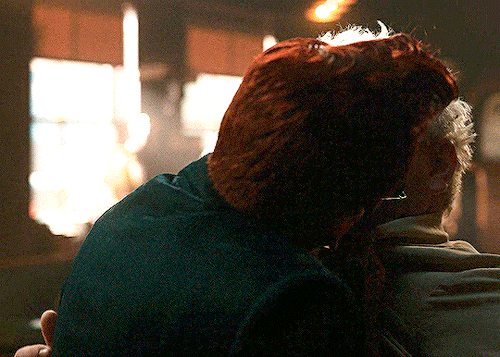
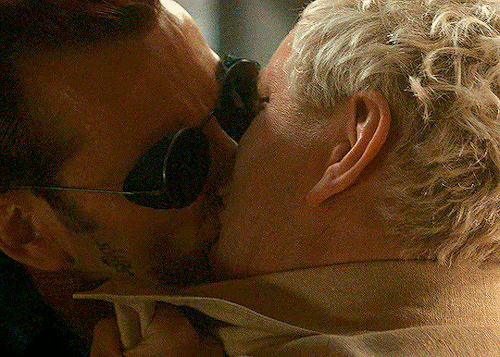
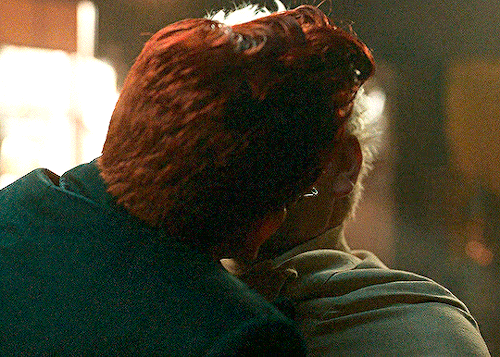
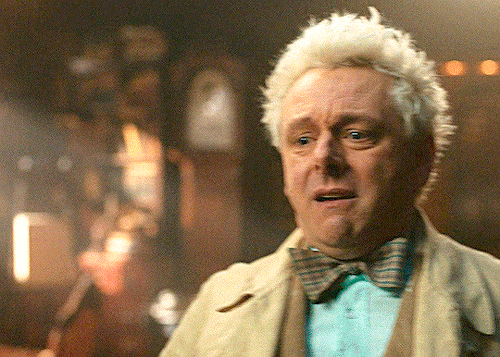

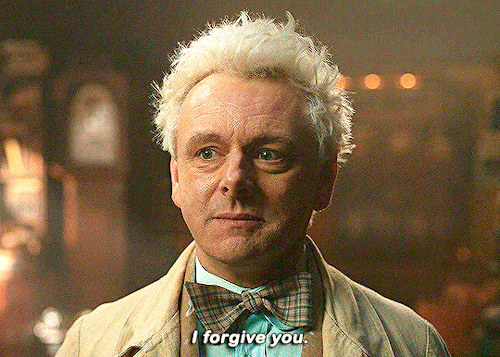
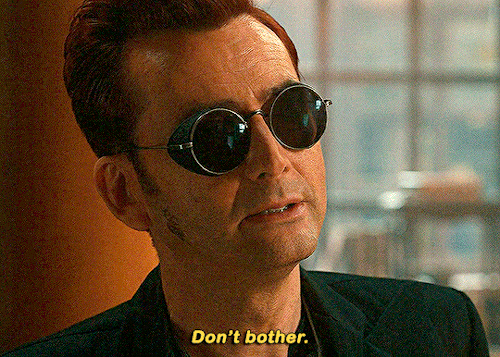
You idiot. We could've been... us.
🎄The David Tennant Christmas Content Masterlist☃ (Part Three)
21. David's Christmas pantos throughout the years
22. Of course, his new Burberry adverts

23. Staged, season three: A Christmas Carol
(part one) (part two)
There are no capital letters capital enough to express how stylistically impeccable that artwork is. WOW is nowhere near enough.

good omens posting !!! (click image for optimal quality)
prints available here
-
 marilen13 liked this · 1 year ago
marilen13 liked this · 1 year ago -
 angrymadsygin liked this · 1 year ago
angrymadsygin liked this · 1 year ago -
 adder24 reblogged this · 1 year ago
adder24 reblogged this · 1 year ago -
 adder24 liked this · 1 year ago
adder24 liked this · 1 year ago -
 izhunny reblogged this · 1 year ago
izhunny reblogged this · 1 year ago -
 happy-turtle48 liked this · 1 year ago
happy-turtle48 liked this · 1 year ago -
 tsuntsunfangirl reblogged this · 1 year ago
tsuntsunfangirl reblogged this · 1 year ago -
 k1ranishf4 liked this · 1 year ago
k1ranishf4 liked this · 1 year ago -
 crowazira liked this · 1 year ago
crowazira liked this · 1 year ago -
 mattbreathsmarvel liked this · 1 year ago
mattbreathsmarvel liked this · 1 year ago -
 twentyfirstmatrix liked this · 1 year ago
twentyfirstmatrix liked this · 1 year ago -
 untilthe12ofnever liked this · 1 year ago
untilthe12ofnever liked this · 1 year ago -
 photoboothcryptid liked this · 1 year ago
photoboothcryptid liked this · 1 year ago -
 heckin-hecuba reblogged this · 1 year ago
heckin-hecuba reblogged this · 1 year ago -
 heckin-hecuba liked this · 1 year ago
heckin-hecuba liked this · 1 year ago -
 allons-y10 liked this · 1 year ago
allons-y10 liked this · 1 year ago -
 savj2003 liked this · 1 year ago
savj2003 liked this · 1 year ago -
 genderqueer-hippie reblogged this · 1 year ago
genderqueer-hippie reblogged this · 1 year ago -
 katspause liked this · 1 year ago
katspause liked this · 1 year ago -
 captainspectrumreportingforduty reblogged this · 1 year ago
captainspectrumreportingforduty reblogged this · 1 year ago -
 captainspectrumreportingforduty liked this · 1 year ago
captainspectrumreportingforduty liked this · 1 year ago -
 somethinglikethatyeah83 liked this · 1 year ago
somethinglikethatyeah83 liked this · 1 year ago -
 fanofmayhem liked this · 1 year ago
fanofmayhem liked this · 1 year ago -
 pandaheart333 liked this · 1 year ago
pandaheart333 liked this · 1 year ago -
 whathehe11 reblogged this · 1 year ago
whathehe11 reblogged this · 1 year ago -
 ehmehneh reblogged this · 1 year ago
ehmehneh reblogged this · 1 year ago -
 rosez234 liked this · 1 year ago
rosez234 liked this · 1 year ago -
 ilajudica reblogged this · 1 year ago
ilajudica reblogged this · 1 year ago -
 grimdarks liked this · 1 year ago
grimdarks liked this · 1 year ago -
 obsessedobsesser reblogged this · 1 year ago
obsessedobsesser reblogged this · 1 year ago -
 princessconsuelapark liked this · 1 year ago
princessconsuelapark liked this · 1 year ago -
 doolittleandco reblogged this · 1 year ago
doolittleandco reblogged this · 1 year ago -
 doolittleandco liked this · 1 year ago
doolittleandco liked this · 1 year ago -
 shittyemohellerfriend reblogged this · 1 year ago
shittyemohellerfriend reblogged this · 1 year ago -
 shittyemohellerfriend liked this · 1 year ago
shittyemohellerfriend liked this · 1 year ago -
 anxiousbeanpurrito liked this · 1 year ago
anxiousbeanpurrito liked this · 1 year ago -
 flintstill reblogged this · 1 year ago
flintstill reblogged this · 1 year ago -
 clowncollegevaledictorian liked this · 1 year ago
clowncollegevaledictorian liked this · 1 year ago -
 florals-cardigan reblogged this · 1 year ago
florals-cardigan reblogged this · 1 year ago -
 florals-cardigan liked this · 1 year ago
florals-cardigan liked this · 1 year ago -
 greybluescarf liked this · 1 year ago
greybluescarf liked this · 1 year ago -
 brightoleander liked this · 1 year ago
brightoleander liked this · 1 year ago -
 lifeisinthepixels liked this · 1 year ago
lifeisinthepixels liked this · 1 year ago -
 sunset-cowboy liked this · 1 year ago
sunset-cowboy liked this · 1 year ago -
 bringtheprosetothewheel liked this · 1 year ago
bringtheprosetothewheel liked this · 1 year ago

Doctor Who, Good Omens and basically everything DT is in | Not a shipper per se, but feel rather partial to tensimm f***ed-up dynamics. Some other stuff as well - Classic Rock (mostly British), Art Deco, etc
228 posts